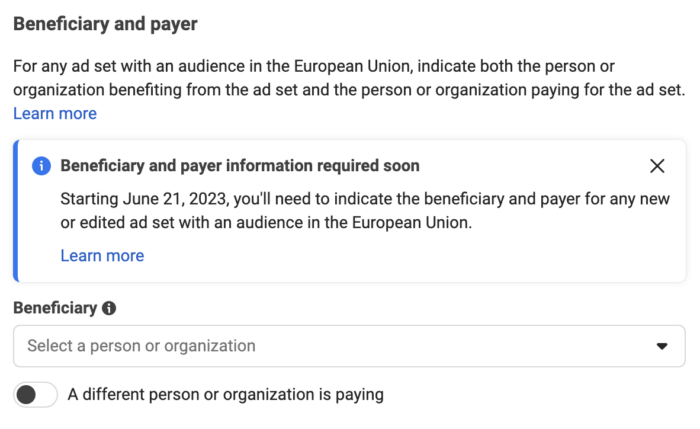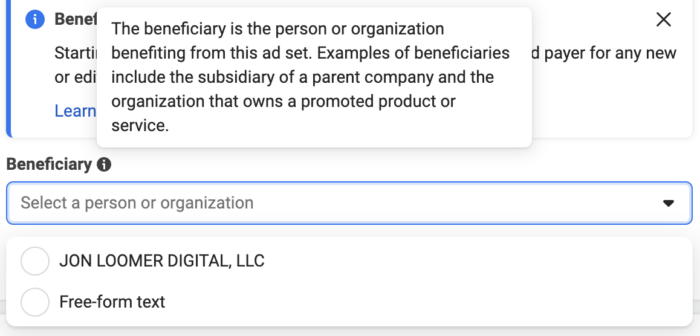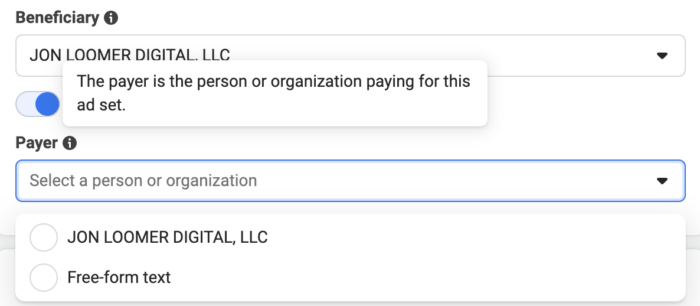If you target any country or territory within the European Union, you are now required to provide beneficiary and payer information.
Let’s clarify what this means…
The Regulatory Requirement
The EU Digital Services Act (DSA) requires Meta to provide information on the beneficiary and payer of ads that target anyone living within the European Union.
The beneficiary is the brand, person, or candidate that benefits directly from the ad. The payer is the one paying for it. That may sound obvious, but there will be some confusion surrounding this.
My interpretation is that the payer isn’t necessarily the source of the credit card on file for the ad account. The ad agency isn’t the payer, for example. The payer would be the entity that paid the agency for that ad.
In many cases, the beneficiary and payer will be the same entity. If you’re a small business running ads to promote your product, that’s pretty clear cut.
But it starts to get a bit complicated when it’s the parent company paying for ads (the payer) that promote a subsidiary (the beneficiary).
If you aren’t familiar with the countries and territories included within the European Union, I won’t be listing them here (there are many). But Meta’s announcement on this lists them all.
Bottom line: This isn’t legal advice, and you should never listen to me for legal advice. If you are unclear about how this should be handled, contact a lawyer.
The Ad Set
Once you include a country or territory from the European Union (or target worldwide), you will see the following message…

You will first need to provide the beneficiary…

The drop-down menu should automatically list the name of the verified business that is connected to your business account. It does appear that the business needs to be verified to appear here.
If the name of the entity you need to use doesn’t appear, you can provide free-form text.
If the beneficiary and payer are the same entity, you won’t need to do anything else. Otherwise, hit the slider to indicate that a different person or organization is paying.

Once again, you can either select from the list or enter the entity free-form.
What Happens June 21?
If you edit, duplicate, or create a new ad that targets users in the EU beginning June 21, you will need to provide beneficiary and payer information. If you do not, the ad will not be published.
Since Meta’s documentation doesn’t mention other currently active ads targeting the EU, I assume that those will continue to run normally unless you attempt to edit or duplicate them.
Meta Ad Library
Since this is all about transparency, it should be no surprise that beneficiary and payer information will be publicly available sometime within the year in the Meta Ad Library. That information will continue to be available for a year following the final impression of your ad.
Of course, very few people access the Meta Ad Library unless they have a very specific reason to do so. The beneficiary and payer information will not appear directly on the ad or in the feed.
Delivery
Meta says that the inclusion of beneficiary and payer will have no impact on the delivery, costs, feature accessibility, or review process related to your ads.
You shouldn’t notice a difference. Users shouldn’t notice a difference. It will just be an extra step that you’ll need to go through.
What Will Advertisers Do?
The first time I saw this, I wondered if this could create an opportunity for advertisers, at least briefly. Let me explain.
There will be initial confusion about what information to provide related to beneficiary and payer. It may generate some legal fears. Some brands or payers may also prefer to keep this information private.
If you’re a small advertiser and you run into this requirement for the first time, are you just going to guess and push through the steps? Will you hold off? Or will you simply choose to target different countries and avoid the hassle?
I would not be surprised to see ad spend drop in the European Union, at least temporarily. That could mean less competition and lower costs for the advertisers who remain.
Watch Video
I recorded a video about this, too. Check it out below…
Your Turn
How do you plan to address this new requirement? Does it impact you?
Let me know in the comments below!







